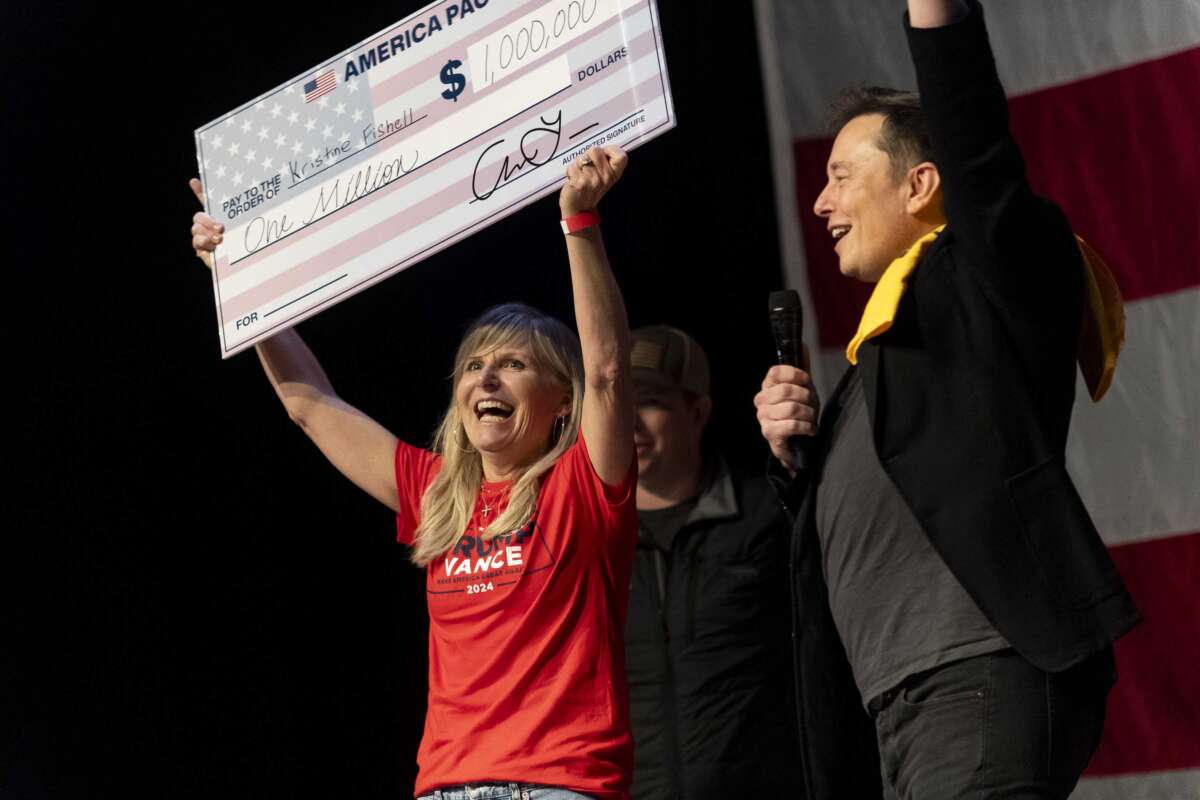Elon Musk and his political action committee are attempting to move a civil lawsuit — which alleges that Musk’s voter registration “lottery” scheme is unlawful — to federal court rather than the Pennsylvania state court system.
Musk’s legal team submitted the filing late Wednesday evening. He was scheduled to appear in Philadelphia County court on Thursday morning, after District Attorney Larry Krasner filed the lawsuit against the billionaire and his America PAC earlier this week. However, federal law requires state courts to delay any further action if a defendant submits a request to move proceedings from state to federal jurisdictions.
Musk asserts that the case is not about “state-law claims of nuisance and consumer protection,” but rather has to do with allegations of election “interference.”
“While [Krasner’s complaint] purports to raise only state-law claims relating to public nuisance and consumer protection, DA Krasner’s claims, as evident on the face of the Complaint, turn principally on the allegation that Defendants are somehow unlawfully interfering with a federal election,” Musk’s legal request maintains, suggesting that such questions of legality belong in a federal setting, not a state-based courtroom.
It’s unclear how quickly a federal court will react to Musk’s filing, and if an action in the case will happen before Election Day. Musk announced a new winner of his unregulated lottery scheme on Thursday morning.
Despite Musk’s legal objections to Krasner’s lawsuit, the district attorney’s complaint is fairly cut-and-dry about the fact that Musk’s lottery appears to be illegal.
Pennsylvania law requires every lottery administered in the state to be regulated by state officials. Musk’s lottery — which awards $1 million daily to a registered voter in a swing state, including Pennsylvania, who has signed a petition supporting the First and Second Amendments to the Constitution — is not regulated in any way.
“America PAC and Musk are lulling Philadelphia citizens — and others in the Commonwealth (and other swing states in the upcoming election) — to give up their personal identifying information and make a political pledge in exchange for the chance to win $1 million,” Krasner’s lawsuit stated. “That is a lottery. And it is indisputably an unlawful lottery. Under unambiguous Pennsylvania law, all lotteries in Pennsylvania must be regulated by the Commonwealth of Pennsylvania.”
The lawsuit also notes that state law defines illegal lotteries as public “nuisances” and that unregulated schemes like Musk’s are in violation of such laws.
The Department of Justice (DOJ) has recognized that Musk’s lottery scheme is likely in violation of federal law, as U.S. statutes forbid anyone from paying or offering to pay “either for registration to vote or for voting,” with steep penalties for individuals or entities that violate those terms. The DOJ, however, has declined to block Musk from continuing his lottery.
Election law experts have also said that Musk’s scheme is probably illegal.
“When you start limiting prizes or giveaways to only registered voters or only people who have voted, that’s where bribery concerns arise,” said Notre Dame Law School professor Derek Muller.
We’re not backing down in the face of Trump’s threats.
As Donald Trump is inaugurated a second time, independent media organizations are faced with urgent mandates: Tell the truth more loudly than ever before. Do that work even as our standard modes of distribution (such as social media platforms) are being manipulated and curtailed by forces of fascist repression and ruthless capitalism. Do that work even as journalism and journalists face targeted attacks, including from the government itself. And do that work in community, never forgetting that we’re not shouting into a faceless void – we’re reaching out to real people amid a life-threatening political climate.
Our task is formidable, and it requires us to ground ourselves in our principles, remind ourselves of our utility, dig in and commit.
As a dizzying number of corporate news organizations – either through need or greed – rush to implement new ways to further monetize their content, and others acquiesce to Trump’s wishes, now is a time for movement media-makers to double down on community-first models.
At Truthout, we are reaffirming our commitments on this front: We won’t run ads or have a paywall because we believe that everyone should have access to information, and that access should exist without barriers and free of distractions from craven corporate interests. We recognize the implications for democracy when information-seekers click a link only to find the article trapped behind a paywall or buried on a page with dozens of invasive ads. The laws of capitalism dictate an unending increase in monetization, and much of the media simply follows those laws. Truthout and many of our peers are dedicating ourselves to following other paths – a commitment which feels vital in a moment when corporations are evermore overtly embedded in government.
Over 80 percent of Truthout‘s funding comes from small individual donations from our community of readers, and the remaining 20 percent comes from a handful of social justice-oriented foundations. Over a third of our total budget is supported by recurring monthly donors, many of whom give because they want to help us keep Truthout barrier-free for everyone.
You can help by giving today. Whether you can make a small monthly donation or a larger gift, Truthout only works with your support.
